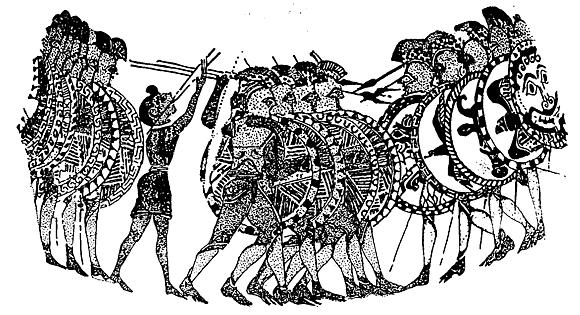 source is taken from a Protocorinthian vase painting which shows two hoplite armies marching towards each other in formation. The boy is playing an aulos, a wind instrument. The music helped keep the soldiers in formation. The Hoplite and the idea of CitizenshipOne of the most obvious changes in the way Greeks functioned ( is in the way they conducted warfare. In the Archaic period, duels between heroes were the standard way the Greeks fought skirmishes. However, upon the end of this period, there was a shift in the preferences from fighting in single contests to fighting in formation called Hoplite warfare. This form of battle tactics was actually much easier for the more of the people to participate in because there was hardly any training involved and hence they were able to continue to work on their fields until conflicts ensue . In addition, the large body of men called the phalanx, which comprised the Hoplite army, was usually made of friends, neighbours, and colleagues therefore giving a semblance of familiarity among the soldiers . Therefore, the shift from individual combat to group warfare may have been the key to wide spread acceptance of the concept of equality as citizens. I
--The primary objective of the phalanx offensive was to push through the
enemy's line. This is
done by heavily reinforcing one’s line of battle with multiple lines of
armoured soldiers up to 8-12 lines deep.
Furthermore, only the front lines actually engage in battle using
large, rounded shields and long thrusting spears while the rest of the
lines pushed forward. Upon
the defeat of the soldier in the front line, the man behind him takes
his place in battle thus covering the gap in formation .
Because of this method of combat, even the most unskilled fighter
can participate in the skirmish and thus be integral in the result of the
conflict. This is because
the emphasis of the Hoplite strategy is not on individual fighting
prowess but is instead highly dependent on the number of men working
together to defeat the enemy . In
addition, the weapons and the armour of the Hoplite soldier were
standardized for all fighters that many of the citizens could supply their own
weapons and in the 4th century the state often supplied them. Such
equipment would be bronze helmets,
bronze breastplates, large shields, short swords, thrusting spears, and
bronze shin guards. Because
the part-time soldier can continue to work on his fields due to the low
requirement for training, he can raise enough wealth to acquire such
relatively expensive armaments. Thus,
because of the greater availability of these weapons and the low
requirement of training necessary to wield them, many who wished
to could participate.
In
addition, because of the lack of specialization in this type of warfare,
the generals and nobles of high rank did not have any unique purpose in
the conflict. Therefore, on
account of this, even the leaders of the armies participated in the
battle alongside the common soldiers .
Epaminondas, a Theban general and strategist, still fought
and died alongside his men in
the phalanx as did the Spartan kings.
The general had no
better task, since he could not influence the course of the battle after
it has begun. Therefore,
because of the lack of specialization in this type of battle strategy, no
man can elevate himself and make him superior over the body of soldiers
by doing anything out of the ordinary.
Thus, due to this, the champion who was once believed to have been
a demigod is now made obsolete. Furthermore,
the warrior of noble rank has now become a soldier who serves alongside
common fighters and functions with them as a single body.
Because of this, it is then apparent that the inability of any one
man to distinguish himself in the field of battle may have led to parity.
Moreover, the necessity of working together as one entity also may
have greatly influenced the idea of equality.
Therefore, through the inception of the Hoplite army, the concept
of equality (regardless of rank, title, or occupation) became a more
palatable notion and thus eventually was incorporated into the Greek
culture and later into the political system.
Through
the equality the Greek men experienced in the battlefield, the concept of
citizenship was perhaps formulated and thus applied into the government.
Because of this, |